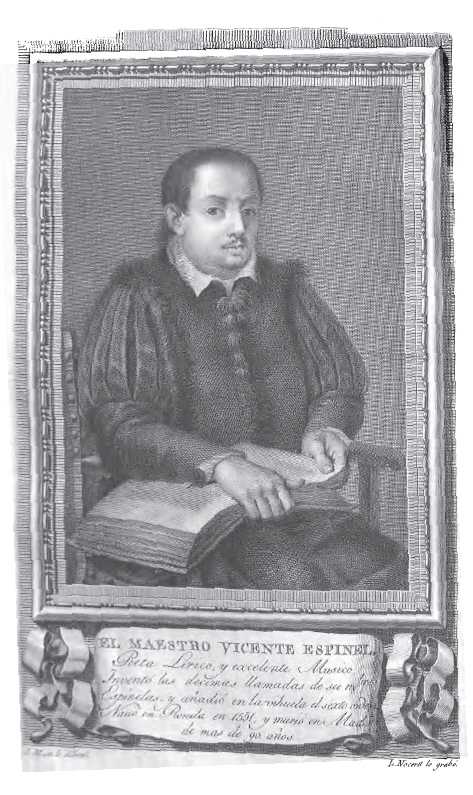 Persona - Espinel, Vicente (1550-1624)
Persona - Espinel, Vicente (1550-1624)
Identificación
Tipo:
Persona
Forma autorizada:
Espinel, Vicente (1550-1624)Otras formas
Fechas de existencia:
Ronda (Málaga, España) 1550-12-28 - Madrid (España) 1624-02-04
Historia:
Poeta, novelista, cantor, guitarrista, compositor, maestro de capilla y sacerdote español.
Nació en Ronda (Málaga) el 28 de diciembre de 1550 y falleció en Madrid el 4 de febrero de 1624.
Se inició en la música con su primer profesor de Gramática, Juan Cansino, en Ronda. Estudió en la Facultad de Artes de la Universidad de Salamanca entre 1570 y 1572. En esta ciudad frecuentó un círculo de nobles cultos, poetas y músicos al que también pertenecía Luis de Góngora. Posteriormente, llevó una vida aventurera, errando por diversas ciudades, al no haberse podido alistar en Santander en la flota proyectada por Felipe II. De allí pasó por Vizcaya, Vitoria, Zaragoza, Burgos y Valladolid para recalar en Sevilla. Con el amparo del duque de Medina Sidonia, Alonso Pérez de Guzmán, nombrado gobernador de Milán, viajó a Italia en 1578, y a Flandes para ponerse a las órdenes de Alejandro Farnesio. Volvió a Milán, hacia 1581, donde recibió el favor de la familia Gonzaga y se relacionó con músicos y literatos de aquella corte. Regresó a España y, antes de 1586, fue ordenado sacerdote en Málaga; también obtuvo un medio beneficio en la iglesia de Santa María de Ronda.
En Madrid, gracias al duque de Alba, publicó su obra Diversas rimas [...] con el Arte Poética, y algunas Odas de Oracio, traduzidas en verso Castellano (1591), que incluye poemas amorosos en lenguaje garcilasiano, otros en metros castellanos -entre los que figura uno que incorpora la variante de la décima luego llamada «espinela»-, tres epístolas horacianistas y la primera traducción al castellano de Arte poética de Horacio. Se trasladó a Ronda para cumplir con sus obligaciones como capellán, pero abandonó la ciudad definitivamente para instarse en la corte en 1599. Ese año se graduó como Maestro en Artes en la Universidad de Alcalá de Henares (Madrid). También obtuvo una capellanía y el nombramiento de maestro de capilla del obispo de Plasencia, en la iglesia madrileña de San Andrés, con dotación económica que disfrutó hasta el final de sus días.
Relacionado con eminentes figuras de las letras españolas, como Miguel de Cervantes, Mateo Alemán, Lope de Vega, Góngora o Francisco de Quevedo, fue ganando prestigio como escritor y músico. En 1618 publicó en Madrid su famosa novela picaresca Vida del escudero Marcos de Obregón, donde, en ciertos pasajes, demuestra su conocimiento de la práctica musical y de los compositores de su tiempo. Lope de Vega, en algunas piezas teatrales, destaca su maestría y consolida la leyenda de haber añadido la quinta cuerda a la guitarra. En La viuda valenciana (ca. 1600) Lope le llama "padre de la música"; en El caballero de Illescas (1602) escribe en la dedicatoria: "Debe España a vuesa merced señor Maestro, dos cosas, que aumentadas en esta edad la ilustran mucho: las cinco cuerdas del instrumento que antes era tan bárbaro con cuatro, los primeros tonos de consideración de que ahora está tan rica y las diferencias y géneros de versos con nuevas elocuciones y frasis, particularmente las décimas [...]" y se dirige a él como "Maestro mío"; y en la narración en prosa La Dorotea, publicada en 1632, un personaje dice: "[...] estas nuevas décimas o espinelas que se usan: perdóneselo Dios a Vicente Espinel, que nos trujo esta novedad y las cinco cuerdas de la guitarra [...]".
A diferencia de sus obras literarias, estudiadas y reeditadas hasta hoy, no se conserva pieza musical alguna de Espinel. Aunque, por diversas fuentes, se sabe que compuso para la citada capilla del obispo de Plasencia. También fue muy celebrado como autor las canciones que interpretaba, acompañándose de la guitarra, en las tertulias y academias a las que acudían ilustres literatos y músicos de su tiempo.
Ocupaciones
actividad:
actividad:
actividad:
(Función) Desempeña/lleva a cabo/realiza:
actividad:
actividad:
Lugares
Lugar de Nacimiento:
Lugar de Defunción:
Fuentes
Relaciones
Relaciones asociativas :
Enlaces Externos
Biografía virtual:
Documentos
Productor de:
- No hay Unidades de Descripción asociadas.






